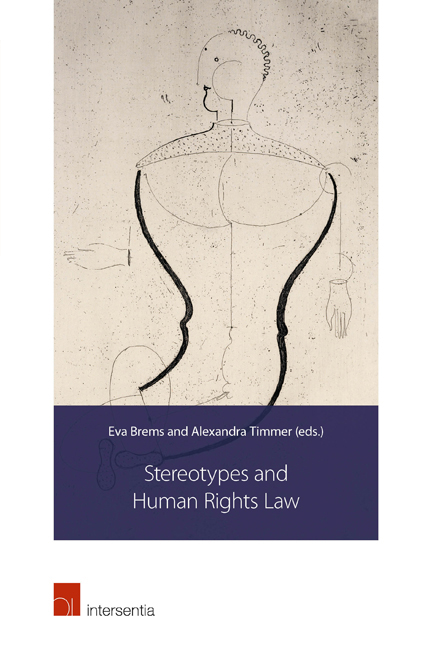Book contents
- Frontmatter
- Contents
- Introduction
- Building Momentum Towards Change. How the UN's Response to Stereotyping is Evolving
- Gender Stereotyping in Domestic Violence Cases. An Analysis of the European Court of Human Rights’ Jurisprudence
- Gender Stereotyping in the Case Law of the Inter‑American Court of Human Rights
- ‘My Sense of Humanity Has Gone Down the Drain’. Stereotypes, Stigma and Sanism
- Racial Stereotypes and Human Rights
- The Head of the Woman is the Man. The Failure to Address Gender Stereotypes in the Legal Procedures around the Dutch SGP
- Gender Stereotyping in the Military. Insights From Court Cases
Building Momentum Towards Change. How the UN's Response to Stereotyping is Evolving
Published online by Cambridge University Press: 22 December 2017
- Frontmatter
- Contents
- Introduction
- Building Momentum Towards Change. How the UN's Response to Stereotyping is Evolving
- Gender Stereotyping in Domestic Violence Cases. An Analysis of the European Court of Human Rights’ Jurisprudence
- Gender Stereotyping in the Case Law of the Inter‑American Court of Human Rights
- ‘My Sense of Humanity Has Gone Down the Drain’. Stereotypes, Stigma and Sanism
- Racial Stereotypes and Human Rights
- The Head of the Woman is the Man. The Failure to Address Gender Stereotypes in the Legal Procedures around the Dutch SGP
- Gender Stereotyping in the Military. Insights From Court Cases
Summary
INTRODUCTION
The number of human rights issues commanding and deserving attention throughout the world is undeniably shocking. A broad range of factors affect whether or not any of those issues receive attention, as well as any action that is taken to address them. If and how the United Nations (UN) responds to particular human rights issues is one factor that is often critical in generating and sustaining interest in an issue. It can also be important in the identification of solutions that will bring about real change in respect of that issue – ones that are capable of ensuring the recognition, exercise and enjoyment of human rights and fundamental freedoms.
This chapter examines the UN's evolving response to one particular human rights issue, namely stereotyping. It explains that interest in gender stereotyping has increased significantly within the UN over the past five or so years and that interest in disability stereotyping has also grown during this time, albeit to a far lesser extent. It argues that the heightened interest in, and examination of, gender and disability stereotyping has contributed to improved UN responses to those types of stereotyping, which has, in turn, aided the identification of solutions that seek to bring about change for people experiencing those types of stereotyping. The Committee on the Elimination of Discrimination against Women (CEDAW Committee or Committee), it is claimed, has been a leader in this regard.
While there has been a noticeable evolution in responses to gender and (to a lesser extent) disability stereotyping over the past half-decade, the chapter contends that UN human rights mechanisms have given comparatively little attention to other types of stereotyping and that their responses to this issue have been ad hoc and weak as a result. A number of reasons are offered for the differing responses: the absence of express treaty obligations dealing with those other types of stereotyping; the limited awareness amongst many UN mechanisms of relevant treaty obligations; and the failure of many UN mechanisms to identify, and seize opportunities to hold States Parties accountable for, relevant stereotyping violations.
- Type
- Chapter
- Information
- Stereotypes and Human Rights Law , pp. 11 - 38Publisher: IntersentiaPrint publication year: 2016
- 3
- Cited by



